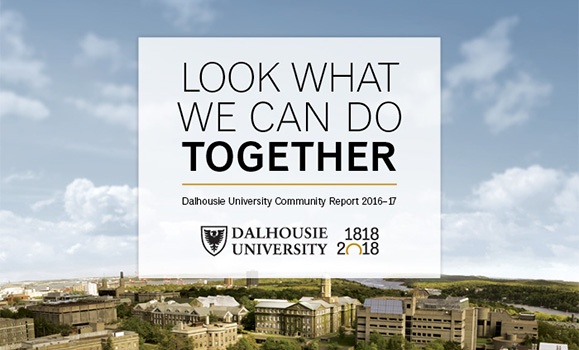It’s hard to imagine Nova Scotia without Dalhousie — and vice versa.
As the province’s leading research university, Dalhousie graduates thousands of highly-qualified students annually, students who help shape their communities, locally and around the world. The university brings in $135 million in research funding each year and contributes more than $1 billion to the provincial economy.
But this work only happens through collaboration: partnerships not just on campus, but in Dal’s broader communities, that bring the university’s teaching and learning, research, and service mission to life.
On Wednesday, the university released a new digital publication: the first edition of an annual Community Report. Featuring highlights from the past year, its focus is on partnership, with the title “Look What We Can Do Together.”
“I always say that ‘no one does anything alone,’ and that is so clearly evident in our past year at Dalhousie,” says President Richard Florizone. “Our success is built on partnerships, expanding the reach and scope of our work and, together with our partners, making a difference in our local communities, our country and our world.”
A focus on collaboration
While strategically aligned with other institutional reports (including the annual Inspiration and Impact Progress Report, President Florizone’s year-in-review sessions), this new report differs in that its primary audience is Dal’s external community, and its focus is largely on projects that bring together partners from across sectors, borders, cultures and beyond.
The Community Report features four highlight stories, focusing on Nursing student Maike van Neikerk’s Rhodes scholarship, battery researcher Jeff Dahn’s Herzberg Gold Medal, John Risley’s catalytic gift in support of the Ocean Frontier Institute and efforts across the university to support diversity and inclusion (including those of Indigenous camp counsellor Brianna Noseworthy). The report also includes a message from President Florizone, year-in-review highlights, and high-level performance indicators such as overall enrolment, total research funding and more.
The Community Report is a digital publication, and is being shared broadly via email with community partners, current and prospective donors, government officials, alumni leaders, neighbours and many others. It was developed and designed by the university’s Communications and Marketing team.
You can read the full Community Report online at dal.ca/communityreport.

